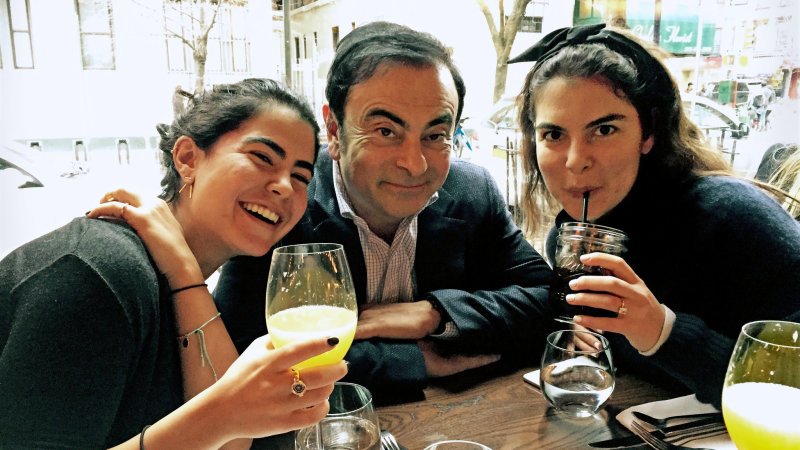Carlos Ghosn's jail time extended, as family says he was framed

Former Nissan chairman Carlos Ghosn will be detained at least through Jan. 11, the Tokyo District Court said Monday, as the once-revered auto industry figure faces allegations that have marked a stunning downfall.
Ghosn, who led Nissan Motor Co. for two decades and helped save the Japanese automaker from near bankruptcy, was arrested Nov. 19 on suspicion of falsifying financial reports. He also faces a breach of trust allegation, for which his detention had been approved previously through Jan. 1.
The Tokyo District Court said in a statement that it had approved prosecutors' request for a 10-day extension.
Ghosn has been charged in the first set of allegations, about under-reporting Ghosn's pay by about 5 billion yen ($44 million) in 2011-2015.
Those close to Ghosn and his family say he is asserting his innocence as the alleged underreported amount of money was never really decided or paid, and Nissan never suffered any monetary losses from the alleged breach of trust.
It is unclear when Ghosn may be released on bail. Tokyo prosecutors consider Ghosn, a Brazilian-born Frenchman of Lebanese ancestry, a flight risk.
In Japan, formal charges can mean a suspect will get detained for months, sometimes until the trial starts, because of fears of tampered evidence.
Some experts are puzzled that the allegations against Kelly and Ghosn are about underreporting income from Nissan. Nissan is in charge of filing such financial reports, not individual executives.
Over the weekend, The New York Times published an article, "The Rise and Fall of Carlos Ghosn," describing his arrest as well as his almost legendary ascendance as the outsider who saved Nissan: "He was a person who was above the clouds," said one Nissan employee. But it's clear from the article that his autocratic style has long rankled the Japanese.
In a sidebar, the NYT also covered accusations from Ghosn's daughters that Nissan had set him up for a fall, part of a mutiny against his explorations of a merger between Nissan and Renault. They point out that Hiroto Saikawa, the chief executive of Nissan, complained about the nature of the alliance in the first news conference following Ghosn's arrest.
"Wow," daughter Caroline Ghosn said. "He didn't even waste a breath. He didn't even try to cover up the fact that the merger had something to do with this."
The NYT articles included Ghosn family photos showing a softer side to the stern auto executive.
Another Nissan executive, Greg Kelly, was arrested on suspicion of collaborating with Ghosn on the under-reporting of income and was freed Dec. 25 on 70 million yen ($635,600) bail after more than a month of detention.
Kelly said in a statement released through his lawyers he had suffered while in detention because of his neck ailment and hoped to get medical treatment. He also said he was innocent and hoped to regain his reputation.
"I expect that the trial will start soon. I have not been involved in alleged false entry. I believe my innocence will be revealed in the trial," Kelly said.
Falsifying financial reporting is a serious crime in Japan, with a maximum penalty of 10 years in prison, a 10 million yen ($89,000) fine, or both. But some experts are puzzled that the allegations against Kelly and Ghosn are about underreporting income from Nissan. Nissan is in charge of filing such financial reports, not individual executives.
Past cases of companies and officials getting charged in Japan with falsifying such reports tend to be about misrepresenting company profits or other numbers that relate to the overall operations of the business, not executive compensation.
Nissan as a legal entity has also been charged in the underreporting of income. But no other individuals besides Ghosn and Kelly have been arrested or charged.
The latest allegations of breach of trust against Ghosn, according to prosecutors, center around having Nissan shoulder a private investment loss of 1.8 billion yen ($16 million) in 2008, and having Nissan transfer $14.7 million to another company.
Nissan has said Ghosn and Kelly were the masterminds behind a scheme to underreport income and use company money and assets for personal gain. Nissan officials have been cooperating closely with the prosecutors in the investigation. Suspects in Japan are routinely interrogated daily without a lawyer present, although lawyers are allowed to visit their clients.
Renault SA of France, which owns 43 percent of Nissan, has chosen to retain Ghosn while naming an interim chair. Nissan has ousted Ghosn as its chairman, although he remains on its board of directors.
Worries are growing about the future of the Renault-Nissan-Mitsubishi alliance, which includes another smaller Japanese automaker, Mitsubishi Motors. Renault and Nissan say they remain committed to the partnership.
Related News


